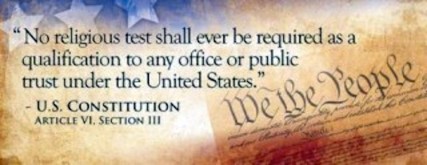Our Founding Fathers’ Beautiful Attempt at Religious Freedom and Tolerance
In 1787, when Madison attended the Constitutional Convention in Philadelphia, he wanted Jefferson’s plan for the separation of church and state to become the law of the land. And as framed in Philadelphia that year, the U.S. Constitution clearly stated in Article VI that federal elective and appointed officials “shall be bound by Oath or Affirmation, to support this Constitution, but no religious Test shall ever be required as a Qualification to any Office or public Trust under the United States.”
This passage — along with the facts that the Constitution does not mention God or a deity (except for a pro forma “year of our Lord” date) and that its very first amendment forbids Congress from making laws that would infringe of the free exercise of religion — attests to the founders’ resolve that America be a secular republic. The men who fought the Revolution may have thanked Providence and attended church regularly — or not. But they also fought a war against a country in which the head of state was the head of the church. Knowing well the history of religious warfare that led to America’s settlement, they clearly understood both the dangers of that system and of sectarian conflict.
It was the recognition of that divisive past by the founders — notably Washington, Jefferson, Adams and Madison — that secured America as a secular republic. As president, Washington wrote in 1790: “All possess alike liberty of conscience and immunity of citizenship. …For happily the Government of the United States, which gives to bigotry no sanction, to persecution no assistance requires only that they who live under its protection should demean themselves as good citizens.”
He was addressing the members of America’s oldest synagogue, the Touro Synagogue in Newport, Rhode Island (where his letter is read aloud every August). In closing, he wrote specifically to the Jews a phrase that applies to Muslims as well: “May the children of the Stock of Abraham, who dwell in this land, continue to merit and enjoy the good will of the other inhabitants, while every one shall sit in safety under his own vine and figtree, and there shall be none to make him afraid.”
As for Adams and Jefferson, they would disagree vehemently over policy, but on the question of religious freedom they were united. “In their seventies,” Jacoby writes, “with a friendship that had survived serious political conflicts, Adams and Jefferson could look back with satisfaction on what they both considered their greatest achievement— their role in establishing a secular government whose legislators would never be required, or permitted, to rule on the legality of theological views.”
Comments?







